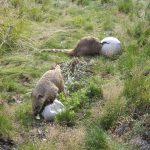Born To Be Wild!

Flamingo Land is pleased to announce the birth of yet another baby!
A male scimitar-horned oryx was born five weeks ago in the zoo. He has been born into our collection of six females, which should be being joined by a new breeding male shortly. The young oryx will stay with his mum and rely on her for about the first 14 weeks of his life.
Our oryx are involved in a European breeding programme because these animals are classed as extinct in the wild. Therefore it is extremely important that zoos continue to breed this species to ensure it does not become extinct altogether. The main threats that these animals face include hunting for their meat, hides and their very large horns. These animals are found in the Sahara desert, so any drought that occurs can also affect populations if their food supply decreases. They are able to survive without drinking for nine to ten months, so a lack of water would not be a problem for them! Their kidneys are adapted to survive such extremes as they minimise the urine production, therefore retaining vital water in their body.
If we receive an adult male in the next month or two, this will fit with the natural breeding season for these animals. Babies would then be born around March, ready for the slightly warmer weather and better conditions in spring. Reintroduction programmes are in place to gradually release these oryx in Tunisia and Morocco. Some populations are currently living in National Parks, where they are constantly monitored to check their progress and a vet is always close at hand if any trouble arises. It’s hoped that their offspring can also be released back into their natural habitat, gradually changing their status from extinct in the wild.
Our scimitar-horned oryx can be found in a mixed species exhibit in Flamingo Land with some of our zebra and lechwe, located next to our wallaby walkthrough. The baby can be a little tricky to spot, but will be sitting with the other females in the grass.
Lindsay Taylor
Education Officer



